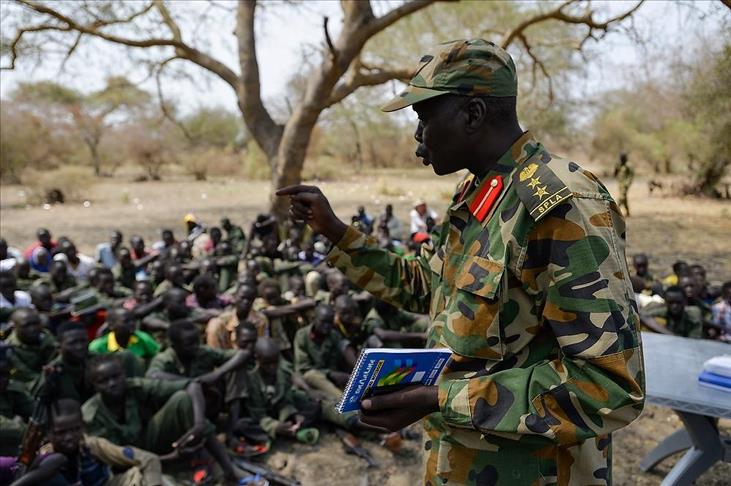
By Okech Francis
PIBOR, South Sudan
Ngaido Kongkong, a 30-year-old mother, sells tea for a living in South Sudan's eastern town of Pibor, some 342km from capital Juba.
She lost her husband back in 2006 and has since had to fend for herself and her five children.
One of the main challenges Kongkong faces, however, is the lack of medical care.
According to her, the illnesses that most often afflict her and her children are cough, diarrhoea and malaria.
"The problem I have is the issue of treatment," Kongkong told The Anadolu Agency in the remote town located near the Ethiopian border.
The town has only one medical facility, which is run by Paris-based humanitarian aid group Doctors without Borders (MSF).
"At this hospital, we are given tablets, but they are not strong enough to cure sickness, unless we go to a clinic in the town," Kongkong said.
She lamented that many people were suffering – and some had died – because there were too few doctors to attend to them.
"If my children are sick, I prefer to buy medicine from the clinic," Kongkong said.
The Greater Pibor is a new administrative area carved out of South Sudan's Jonglei State in 2014 after President Salva Kiir's government reached a peace deal with a local rebel group – the South Sudan Democratic Movement-Cobra Faction, led by David Yau Yau – after five years of on-and-off rebellion.
Following his defeat in 2010 for the Gumuruk constituency seat in the Jonglei State Parliament, Yau Yau, a former theology student, rebelled against the government, claiming the area had been marginalized in terms of service delivery and development.
During a brief truce in 2011, he accepted an amnesty and returned briefly, only to resume his rebellion in 2012, accusing the government of not honouring the terms of the truce deal.
Following the resumption of his rebellion, the army launched an intense military offensive in the area, which drove the majority of Yau Yau's ethnic Murle people to join his rebel group, including large numbers of women, children and the elderly.
During the insurgency, Pibor was virtually destroyed in numerous battles between the army and rebels.
The former rebel group is currently undergoing a reintegration and demobilisation process, in which 1,757 former child soldiers have already been decommissioned.
No water
Access to Pibor is either by mud road through Bor – the capital of Jonglei State, which remains impassable during the rainy period – or by air.
In the rainy season, the airstrip is often cut off for days for big planes, leaving only the use of helicopters – a costly prospect for humanitarian agencies who visit the area on a frequent basis.
Service delivery in the area – including health, education and other basic needs, like clean water and good roads – remain sorely wanting.
Clean water is hard to get for much of the population, who opt for the nearby Kengan River.
"Water is a challenge," Marco Maraka, a 29-year-old volunteer teacher in the town, told AA. "Boreholes are very few and cannot assist everybody."
Maraka said people usually resort to the river to get water, as do cattle and wild animals.
"It is even used for washing and bathing," added the teacher.
AA spoke with Santa Kariche, a woman in her mid-30s, at one local water point.
"I always try to get clean water here," she said. "But it is not easy in the evening, when everybody is looking for clean water. The place becomes very congested."
Sometimes, Kariche goes to the river for water when the water point area is overcrowded.
"I use the water for washing clothes, cooking food and bathing my children, me and my husband," she said.
On a visit to Pibor on April 28, Ellen Magrethe Loej, special representative of the UN secretary-general and head of the UN Mission in South Sudan, stressed the need to provide better services to the area.
Militarized
Pibor is dotted with military tents and civilian huts in between them, showing how civilians had been caught up in Yau Yau's insurgency.
The few shops in the town are owned mainly by Sudanese from the Darfur region.
The police post is housed in an old building that also serves as a prison.
What stand out are Yau Yau's newly-built administrative buildings, over which the Pibor and South Sudanese flags fly.
"Development will come to our area," Yau Yau, who is now the administrator of the greater Pibor area, said in an interview with AA. "The government has promised us this."
He recognizes that the ongoing conflict between President Salva Kiir and rebels loyal to sacked Vice-President Riek Machar "is still making it difficult for the government to send us money."
"But they promised, and I know they will deliver," said the administrator.
South Sudan – which seceded from Sudan in 2011 – has been shaken by violence since late 2013, when Kiir accused Machar of leading a failed coup attempt against his regime.
Tens of thousands have reportedly been killed in subsequent violence, with some 2 million uprooted from their homes and 2.5 million at risk of starvation, according to recent UN estimates.
On-again, off-again peace talks in Ethiopian capital Addis Ababa have failed to produce a breakthrough between Kiir and Machar.
"At the moment, our priority is to maintain peace with ourselves and our neighbors," Yau Yau told AA.
"We are planning on reconciliation, and when we can get some money, we shall engage the communities that surround us so that we get to live amicably together," he said.
"We want to do business with them because this is the only way we can be sure of developing the greater Pibor," the administrator added.
Anadolu Agency website contains only a portion of the news stories offered to subscribers in the AA News Broadcasting System (HAS), and in summarized form. Please contact us for subscription options.

